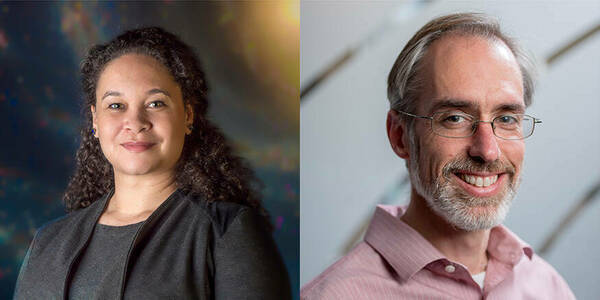
Kevin Lannon, professor in the Department of Physics and Astronomy, has been named associate dean of faculty affairs for the College of Science at the University of Notre Dame. Additionally, L. Arielle Phillips, associate professor of the practice in the Department of Physics and Astronomy, has been named associate dean of collegiate affairs.
Phillips, who had been an assistant dean advising students in the science-education, science-business, and science-computing majors, was promoted after the retirement of Kathleen Cannon, OP, D. Min, who had held the associate dean position. She will continue in the role of overseeing the collegiate sequence, the study abroad program for College of Science students, and special projects.
“While working closely with Associate Dean Cannon over the past four and a half years, I was able to witness the incredible impact she has had on college and university life, discovering, for example, her role in addressing the needs of staff and faculty on our campus,” Phillips said. “I will endeavor to carry on part of Sister Cannon's work in shaping the experience of our collegiate majors and College of Science study abroad cohorts."
Lannon replaces Steve Corcelli, professor of Chemistry and Biochemistry, who was the first person appointed to the newly developed position in 2019. Corcelli fulfilled his term and has moved into the role of chair in the Department of Chemistry and Biochemistry.
Lannon will coordinate faculty recruitment, facilitate faculty reappointment, promotion, and tenure processes, and organize faculty development programs.
“In talking with Steve it was immediately apparent that he had done some really great things for the college,” Lannon said. “One thing I had seen, but did not realize was his initiative, was long-overdue promotions for some non-tenure track faculty who had been overlooked; in talking with Steve, he said that was a priority for him and that was a great, great thing that he did.”
Lannon has been with the University since 2008 and is a member of the international collaboration that runs the Compact Muon Solenoid (CMS) experiment. The CMS experiment collects data from proton collisions generated by the Large Hadron Collider (LHC) at the CERN lab in Geneva, Switzerland. As part of that experiment, Lannon participated in the discovery of the Higgs boson and led the effort to measure the interaction between the Higgs—the particle that gives mass to all other particles—and the top quark, which is the most massive known particle.
In addition, Lannon is also the co-coordinator of all U.S. software development for the experiment, and collaborates with Notre Dame’s Department of Computer Science and Engineering in the College of Engineering, as well as the Center for Research Computing (CRC) to push the boundaries of what’s possible in particle physics through advances in computer science and artificial intelligence.
Lannon, who enjoys teaching, also received the Rev. Edmund P. Joyce, C.S.C. Award for Excellence in Undergraduate Teaching in 2020. He graduated with his bachelor’s degree in physics, mathematics and English from St. Norbert College in DePere, Wisconsin, and earned his doctoral degree from University of Illinois, Urbana-Champaign.
“Santiago (Schnell) seems to be a really exciting person to work with, and I think we can do some good things, especially because Notre Dame has some really great faculty, and that will be my area of responsibility,” Lannon said. “I’m very excited to start my work in this position.”
Phillips was hired as an assistant research professor at Notre Dame in 2009. She earned her undergraduate degree in honors physics, with a minor in mathematics, from McGill University in Montreal, Canada, and her doctoral degree in astrophysical sciences from Princeton University.
She is a fellow of the National Society of Black Physicists, and founded an algebra-based physics program at the Westville Correctional Facility. As physics and astronomy faculty she leads a computational astrophysics research group, advises graduate students, and teaches physics courses at all levels. Her research focuses on large-scale structure cosmology, using computer-based simulations of the universe that couple different cosmologies with structure-finding algorithms. This allows her research group to understand the signature of different forms of dark matter and dark energy that were identified in observational data.
“My love of analyzing large systems extends to a keen understanding of how departments, colleges, and universities function,” she said. This skill has informed her work in areas as broad as faculty recruitment, infrastructure development, and also helps as she addresses the needs of students from under-represented groups.
Phillips has also taught a range of courses for non-majors, majors and graduate students, including “Physics of Civilization,” which was developed for architecture students, and developed local and international STEAM outreach programs she helped build.
“I am delighted to be joining Dean Schnell’s team in this new position. It is a time of transformation for our collegiate sequence, which is approaching its 40th anniversary, and of new opportunities for College of Science participation in the Study Abroad Program,” Phillips said. “I look forward to expanding my role as an advisor, continuing to guide students to make the most of their time at Notre Dame.”
Originally published by at science.nd.edu on September 21, 2022.